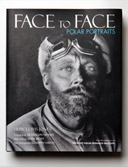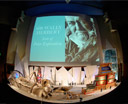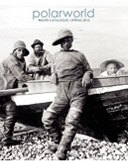 Our ProductsOur Resources |
This website requires the free Flash plugin to be installed.
Polarworld - discover more polar booksThe Arctic Book Review
Edward Beauclerk Maurice Reviewed by Russell A. Potter When one thinks of twentieth–century Arctic memoirs, there's an understandable tendency for them to blur together into a kind of vast featureless blizzard of hubris. With the great era of exploration largely over, reminiscences of the frozen North have vied with one another for some singular circumstance or claim on our attention which might separate them from the pack. Bravado is not necessarily a virtue in the Arctic, and risks seeming foolish when the underlying goal is something already accomplished in the past. It might seem that, with the exception of some new and fantastical combination — say, a one–legged blind man sledging to the Pole while pulling his elderly grandmother behind him on a komatik — there's not likely to be anything new under the Arctic sun. Yet such an assumption is proved wonderfully wrong by Edward Beauclerk Maurice's The Last Gentleman Adventurer, a memoir which is, if one will pardon the pun, the very polar opposite of the boreal braggadicio which has so often passed for Arctic adventure. Maurice, as his family has said and his text clearly evidences, was a quiet, thoughtful, and genuinely humble man, whose enormously engaging prose harks back to an era which, as the book's title implies, is truly bygone. Maurice himself would probably have winced at the title, which might seem to claim more credit and importance for himself than he believed was fair. He was deeply conscious of what he believed was his very modest role in a land, and among a people, whose qualities were far more astonishing than anything to which he — a shy schoolboy with almost no outdoor experience — could have laid claim to. His own title, Igloo Behind the Wind, was meant as a tribute to the Inuit, whom he admired and regarded as the real heroes of his book. Although the back–story is missing from the book's publicity, Maurice actually completed his book decades ago, only to find it rejected by publishers for several reasons, chiefly its length. That it has finally reached print only just after his death at the age of 90, might seem to be bittersweet victory — but the real tragedy would have been had it remained unpublished. For The Last Gentleman Adventurer stands almost alone, not only among Arctic reminiscences, but among memoirs of any kind; its clarity and grace of tone seem like messengers from another, more eloquent world, beside which nearly all other books of its kind sound shrilly in the ear. And yet the emotional tone of the book is so unprepossessing, so utterly without affect, that the reader is hardly conscious of having been swept away. The book opens with an account of Maurice's school–days in the 1930's, framed by the quiet desperation of his family, whose increasingly distressed circumstances eventually led them to emigrate from Britain to New Zealand. On the very edge of this precipice, and quite by chance, young Edward hears a talk by a local Anglican churchman about his missionary work in the Canadian Arctic. For some reason, unaccountable even to himself, Edward's passion for adventure is inflamed by the possibility of a sojourn in this distant and almost unknown country, and almost before he realizes what he has done, he has placed his signature upon a contract binding him as an apprentice in the Hudson's Bay Company. It was this Company (as it was often simply known), whose formal name, the Company of Gentleman Adventurers, lends the book its title, though when it was founded in 1670 under a charter granted by Charles II, the "adventurers" were those who ventured capital, not their lives. Maurice, though a not gentleman in that sense, nevertheless proves himself one by disposition and character, and so perhaps the title is fitting after all. The system of taking young apprentices — John Rae, it may be remembered, became one when he was scarcely two years older than Maurice — was, in any case, coming to an end. The poignancy of his preparations for departure to the almost impossibly remote outposts of the Company is treated with the kind of forthright clarity reminiscent of Roald Dahl's Boy; there is nothing condescending here, as the wisdom of the older man and the anxious uncertainty of the boy give these passages an understated sadness. There is comedy too; when, attempting a crash course in typing which his contract seems to demand, young Edward finds himself the lone boy in a girls' secretarial school. The final parting with his family is simply and poignantly related, followed by a rough passage on a series on increasingly smaller and stouter steamships, ending up on the redoubtable Nascopie. Here, and not for the last time, Maurice discovers that he occupies the very bottom of the totem pole of dignity, his berth perched directly above the deafening roar of the propeller. As each of the other boys is let off at one station or another, it soon becomes clear that Maurice is destined for some especially distant, or especially insignificant outpost — perhaps both. He finds reassurance from the manager of the post at Pond Inlet, who tells him that he's been assigned to Pangnirtung, whose manager, Geordie Gall, is a strict, God-fearing man who will tolerate no swearing and insists upon morning prayers. Sensing that his leg is being pulled, Maurice presses his informant, who merely becomes indignant, eventually producing two witnesses to corroborate the truth of his assessment. Of course, he is pulling his leg — but this is Maurice's introduction to the rugged camaraderie of the North, and so it was a matter of honor to keep up the deception. Pangnirtung, at the time quite a small outpost, turns out to be the last port of call on the Nascopie's seasonal run, and one of the most recent establishments of the Company. There, the Nascopie is met at the entrance to the harbor by a boat carrying Geordie — this famed man of strict character — who, his cheeks nearly as red as his shirt, a straw sombrero perched absurdly on his head, is clearly 'four sheets to the wind.' So much for eyewitness testimony. The cargo is unloaded, and the Nascopie on its way south, within a few hours; whatever transpired next, there was no turning back from this point onward. For years, Maurice tells us, the Hudson's Bay Company had marked its annual shipments of supplies with the year shippped, with those delivered the first year — 1670 — numbered 1, the next year's supplies 2, and so forth. By the time Maurice was unloading cargo from the Nascopie, the number had reached 260 — it was not for naught that it was said that H.B.C. stood for "Here Before Christ". For a young man in the service of a very old Company, Maurice was, and looked, younger than most, leading one woman at a trading post to declare that the H.B.C. had no business sending children so far north. A few weeks after his introduction to the Inuit who called at Pangnirtung, Maurice was distressed to discover that they had named him, simply, "The Boy." But although he protested this sobriquet, there was clearly a great deal Maurice had to learn. He found himself drawn to the local Inuit, curious about their means of hunting and living, and curious most of all about their language. He had ample opportunity to learn, as Geordie sent him off almost immediately on a fall hunting trip in the care of Kilabuk and Beevee, the two post servants. Both of these Inuit had considerable experience with whalers and trading–posts, and they took the new apprentice under their wing, instructing him in the mysteries of the Primus stove and telling him the first of many traditional stories of the old shamanistic world that he would hear. When it came to the actual hunting part, Maurice surprised himself by bringing down a deer at one shot — giving, as he so modestly puts it, "thanks to the school corps drill sergeant, who the previous year had given us a course of instruction in the art of sharpshooting." Whatever the reason, Maurice's skill with the rifle earned him newfound respect from his Inuit companions. It was Kilabuk, later with the assistance of his wife Agiak, who became Maurice's tutors in the intricacies of Inuktitut. After returning from the hunt, Maurice found his way to their igloo almost daily; Kilabuk, once he found that the young man's interest was serious, was delighted to give the project his entire attention. It was Geordie, curiously, who though he himself had taken an Inuk as his common-law wife, warned Maurice against "getting too involved" with the Inuit. Maurice, trying to be helpful, suggested that perhaps there was a difference between being " involved " with the Inuit and being involved with just one person — a distinction which understandably puzzled Geordie. It was a simple fact that most of the post managers had Inuit wives, but the relationship between that convention and any larger understanding of Inuit culture was quite lost on Geordie, as it would have been for most men of his position. Maurice, to his infinite credit, never takes such things for granted, and never once thought of the Inuit as intrinsically different from any other group of people. For a time, Maurice carries on, learning Inuktitut, participating in hunting excursions, and slowly learning the ways of the remote outpost. Their only news of the outside world comes from a cranky short-wave radio, which constantly goes on the fritz every time an important broadcast comes around; despite this, Maurice manages to receive a brief message from his mother to say that his family has arrived safely in New Zealand. In one particularly poignant episode, the base receives a visit from a pair of amateur aviators, whose seaplane was just about to run out of fuel. By scavenging all the kerosene from various parts of the post, Geordie and Maurice are able to fill the plane's tanks; Maurice even adds a lengthy letter home and entrusts it to the pilot. It is only much later, after a lapse of more than a year, that entirely by chance, the pilot's wallet is fished up by a trawler, and returned to Maurice with his letter still inside and undelivered, mute testimony to the hazards of polar aviation. Maurice's biggest test is yet to come, as word reaches the post of an Inuit settlement not far distant. The dogs of these people have died, the news goes, and without the means to hunt, the people are starving. Together with Beevee, a supply of deer meat, and a small medicine chest, Maurice sledges to this remote community, only to find that they are up against more than hunger. The local angekok, or shaman, has decreed that the disease is the result of a new family, strangers to the community, and forbids anyone to visit them or bring them food. Maurice, undaunted, visits the newcomers' igloo, finding that the father has walked away, the children have starved to death, and the mother is too distraught to eat. Gently, he coaxes back her will to live, and then — much to the astonishment of the village (and perhaps himself as well), he visits the angekok and confronts him directly. To the angekok's warning that he and the others in this camp still follow the old ways, and that those who have been in the country only a short time don't understand such things, Maurice offers an astonishing rebuke: "Some of us may only be here for a short time as you say, but we have brought with us our own taboos, which must be obeyed by anyone no matter what their ways are. It is not permitted to say things about others which are not true and which might cause harm. The things you said to stop your people from helping that family have caused the children's deaths. The police would not like to hear this and they might come to take you away if they thought you were causing trouble." Maurice's assertiveness here astonishes his hearers; certainly no–one had ever spoken to the angekok in such a manner before. The insulted shaman manages to have the last word, telling everyone that it was he, not this strange boy from the post, who has brought the community back to health, but it's clear that Maurice has gained newfound respect from the Inuit; on his departure, young Keeta, who had helped him deliver food and medicine, rushes forward with a tiny gift: an ivory carving wrapped in sealskin. It was clear from this point on that Maurice would no longer be "the boy." Thus begins the second section of the book, which takes its title — Issumatak — from the new title,"a leader, one who speaks for others", which Maurice eventually earns. Having weathered his apprenticeship, he is to be dipatched to the post at Ward Inlet at the top of Frobisher Bay. Accompanied by Beevee, he pauses at Blacklead Island, a place which has acquired a bad reputation among the local Inuit. While camped nearby, Maurice and Beevee encounter an elderly Inuk woman, Tukileta, who tells them a story about the abandonment of an old woman ill with tuberculosis, and the failed efforts of the local missionary to eradicate the old beliefs about illness and death. Such matters are not merely abstract, as Maurice soon discovers. A strange disease suddenly crops up among the Inuint camped nearby; severe stomach pains are followed by lassitude and, in an alarming number of cases, death. Is it food poisoning, or some kind of virus? Maurice has only his own inner resources, accompanied by a pitifully inadequate medicine kit, to deal with an illness that is wiping out old and young alike, and terrifying the survivors. With only aspirin and a mild emetic, Maurice manages to blend the little pills of the kudloona with the little rituals and admonitions of the shamanistic worldview, and although he is unable to save everyone, he gains the abiding respect of the community by his ceaseless labors on the behalf of the sickest individuals. By the time he takes up the full responsibilities of post manager at Frobisher Bay, Maurice has become not only a capable Northern trader, but also that rare kudloona who has some grasp of the feelings, the motives, and the social rituals of the Inuit. It is remarkable to watch him as he, too, responds to the endeavors of several differnet Inuit women to pair up with him; here, as much as with the medicine, he must blend cautious rhetoric with tactical bluntness. When Innuk,an older woman with whom Maurice has formed a firm friendship, starts talking up Rebecca, a younger woman, as a potential wife, Maurice has to find a way to accept her advice without giving insult, and he manages, as ever, to do so. The saddest chapters of the book concern another young woman, Nyla, who is one of Maurice's unexpected success stories during the first round of illness. She eventually recovers, although she is never entirely well; when she finally succumbs to tuberculosis a few years later, Maurice's understated feelings are clearly far deeper. As the community inters Nyla's body, singing "Onward Christian Soldiers" at the top of their lungs, Maurice comments ironically that "regardless of whether Nyla could be classed as a 'Christian Soldier' or not, if one has to die so young, it was better to march away with your head in the air than to crawl into eternity on your knees." It's with lines such as these that Edward Beauclerk Maurice makes his lasting mark; gifted with an inherent sense of fierce justice much greater than his years or background might suggest, he is, first and foremost, a tremendously human writer. In his eyes, the Inuit were no less people than he, and no obstacles — cultural differences, rivalries, or the shifting relations of commerce — were reason to see them any differently. He has given us a tremendous gift in this, his life's story, written in the kind of language that we have forgotten how to write, though not to appreciate. "They will come no more, the old men with beautiful manners," wrote Ezra Pound once, and its's a fairly good bet that their — and Maurice's —like will not be seen again. |
|
||
follow us  | join us | join us  | home | contact | home | contact
|
||||
|
© Copyright Polarworld Ltd
SiteWizard.co.uk Web Site Design Company |
||||



 The Last Gentleman Adventurer: Coming of Age in the Arctic
The Last Gentleman Adventurer: Coming of Age in the Arctic